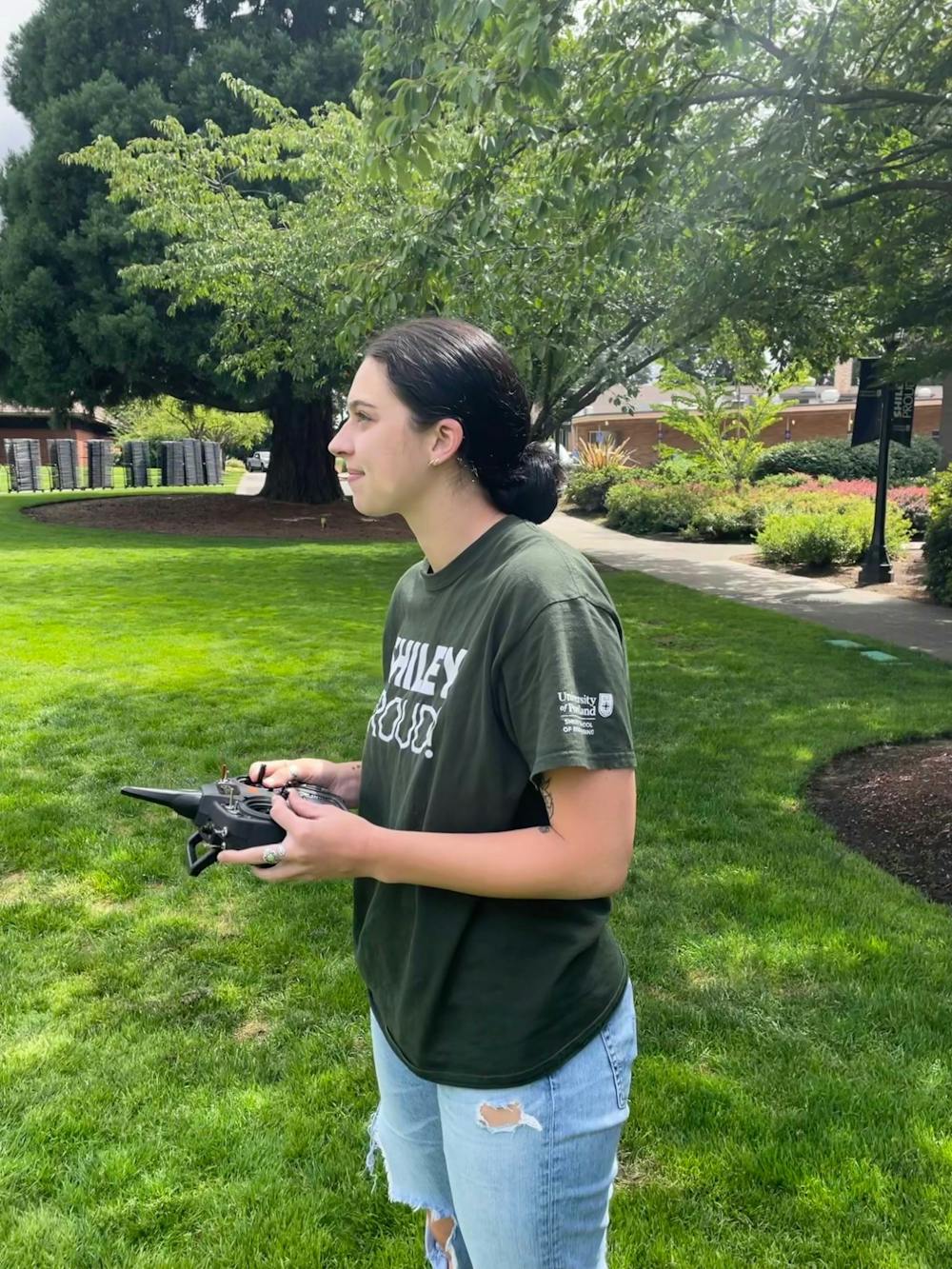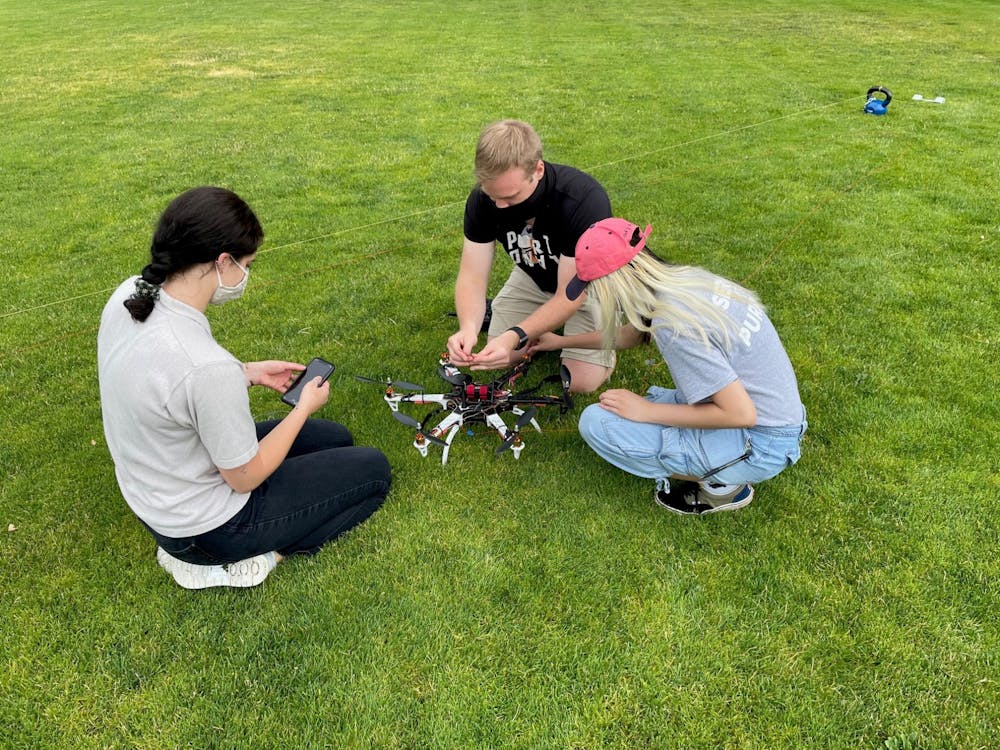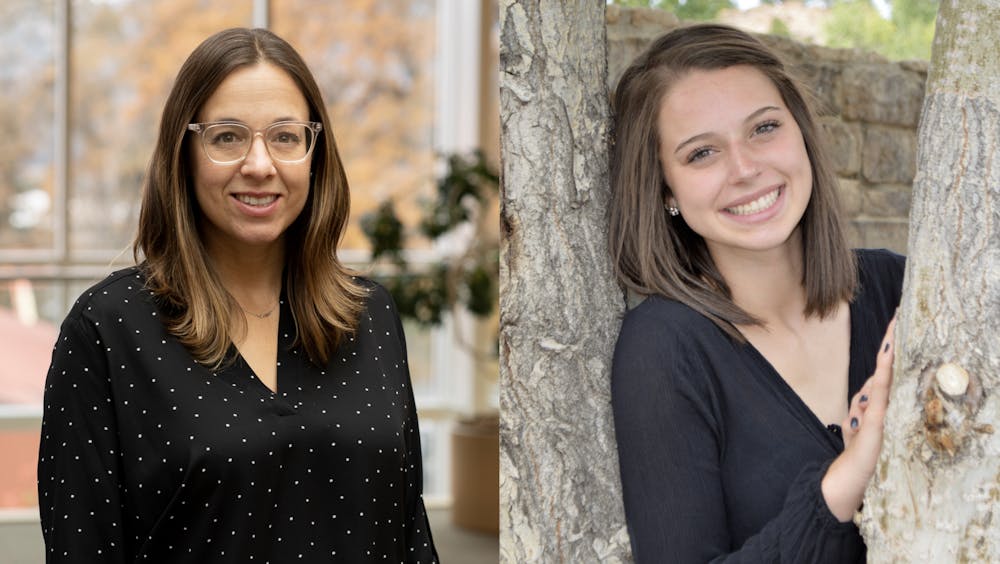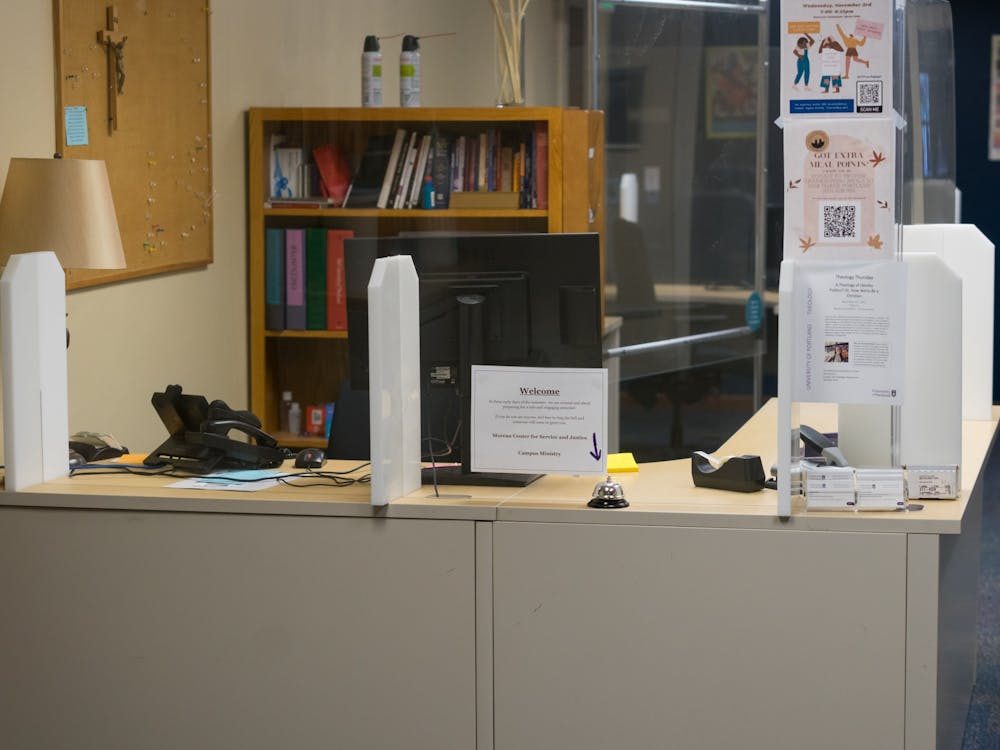The sun is shining, birds are chirping and campus is bustling with life. It’s a sunny day in Portland. But amongst all of the commotion, you hear a faint whirring in the distance.
The sound of several small propellers buzz from above. You spot the drone in the sky. At first glance, it’s like any drone you’ve seen before. But with a double take, you realize this isn’t the DJI Mavic mini your roommate takes on vacation.
It’s called the hexacopter, and it plays a pivotal role in the military-funded undergraduate research on unmanned aerial systems (UAS) being done at UP.
“It started in the summer of 2019,” assistant professor of engineering and former U.S. military engineer Christina Ivler said. “I had four students working with me and we started to develop infrastructure for allowing us to do testing. I have a small unmanned aerial helicopter, a hexacopter, that I fly.”
That infrastructure is what Ivler’s research with senior mechanical engineering major Kate Russell has been building on. Ivler and Russell are working on designing and developing requirements for unmanned aerial vehicles (UAV) — put simply, drones — similar in function to the requirements established by the Federal Aviation Administration for aircraft and helicopters.

Kate Russell flies a UAV (not pictured) with an RC transceiver.
Photo curtesy of Christina Ivler.
Ivler has had several papers published with her undergraduate research assistants. The most recent paper on UAV requirements was published in the Vertical Flight Society in 2021, with undergrads Kevin Truong ‘20, Declan Kerwin ‘20, Joel Otomize ‘21 and Danelle Parmer ‘20.
This year, Ivler and Russell are planning to submit another paper to the Vertical Flight Society building off what’s been done so far, and present at their annual forum.
Over this last summer, the project was funded by the U.S. Army Combat Capabilities Development Command (DEVCOM) group. The research duo recently presented at the UAS Handling Qualities Workshop hosted by Systems Technology, the Navy and NAVAIR.
“We were one of seven groups invited to present, and our work was really well received,” Russell said. “I think it was really cool to help more people see what the University of Portland is contributing to work on UAS.”
The requirements they're trying to design are meant to determine what maneuvers these drones should be able to do to ensure they fly safely, and design a testing regiment to see if those drones meet that criteria for flight.
“I have been doing research since the spring of 2021,” Russell said. “I picked up where those students ended their work. I’ve been focusing on developing maneuvers that the hexacopter can perform to test those characteristics by seeing how well the hexacopter performs those maneuvers.”
According to Ivler, the end goal stems from the concept of advanced aerial mobility, which aims to have unmanned vehicles like small drones, large drones and air taxis all working in the air space together to provide services.
“This fits into that, we’re looking at smaller vehicles,” Ivler said. “The idea is that the framework scales up to bigger ones. One of the critical things to developing this infrastructure is to be able to know how well a drone can stay within its lane… on their safe path.”
Luckily, their research was not disrupted by the pandemic. By the time the duo had to start flight testing, they were able to do so in person.
“Over the summer we were allowed to work on campus, so because of that I was able to work in the lab and we were able to flight test,” Russell said. “I wouldn't say it had a huge impact aside from not being able to present in person and go out to these events.”
Ivler and Russell have also been invited to several working groups based on the presentation that was given at the Handling Qualities Workshop, including invitations from the American Society of Testing and Materials.
“We were invited to this working group that has a lot of members from the FAA, as well as different vertical lift aircraft companies,” Ivler said. “It’s very exciting for a small University to be invited to a high profile working group.”

Kate Russell (left), Will Hunter (center) and Emily Vo (right) kneel in the grass to work on their UAV during a test session.
Photo curtesy of Christina Ivler.
Ivler and Russell are doing related research funded by NASA with senior engineering majors Emily Vo and Will Hunter. This project is using the handling qualities framework designed by Ivler and Russell to test improvements in maneuverability designed by the team to vehicles using multiple rotors. NASA is testing this work on their air taxis in simulation and is also interested in applying this research to planetary rotorcraft, according to Ivler.
One theme overarching Ivler’s and Russell’s research is that they are women doing their work in a very male-dominated field.
“There’s a very small percentage of women in this field,” Ivler said. “Kate and I, I’m pretty sure, were the only female presenters [at the UAS Handling Qualities Workshop]. There were about 100 people there, and looking through the names, there were probably less than 10 women total, including Kate and me.”
Despite this, Ivler has never felt unwelcome in the field. She admits she’s had to prove herself over the years — unsure if that was due to her gender — but feels her work with the army gave her credibility. Both Ivler and Russell admit that it can be intimidating at times.
“It’s definitely intimidating to be one of the only women — or the only woman — in the room,” Ivler said. “But once I got past my own imposter syndrome I felt like I was very welcomed and that people would listen to what I have to say.”
“I agree with that, it’s kind of just the intimidation of it all — knowing you’re presenting in front of mainly men and how you’ll be perceived because of that,” Russell added. “Being able to work with a woman professor has been awesome.”
Ivler’s extensive background has been helpful in developing this research. She studied aeronautical engineering at the University of California at Davis, and got her doctorate from Stanford University in 2013. She has been at UP since 2017, and spent 12 years as a research aerospace engineer for the U.S. Army Research Development and Engineering Command prior to starting her career as a professor at the University.
Russell’s pivotal role in this UAS research with Ivler has helped compose her post-grad plans. After graduating, Russell will work with the aerospace company Blue Origin as a systems engineer on their Test and Launch Team.
Both researchers want to remind students and the community that there is a lot of cutting-edge research going on at UP, and that students can participate in that even in the early stages of their college career.
“Students can be involved in that, even when they’re sophomores or juniors, and be able to make a difference — even as undergraduates,” Ivler said.
Russell’s personal experience with this research has shaped her college career, and offered her experience and insights she may not have had otherwise.
“I think this experience, doing research in undergrad, has been the most valuable experience that I’ll have for professional and personal growth,” Russell said. “Being a part of something like this is really beneficial to finding out what you want to do, and exploring all these different avenues. UP does have access to these cutting-edge technologies. I don’t know if people really know how cool it is and how much there is to offer.”
Austin De Dios is the Editor-in-Chief of The Beacon. He can be reached at dedios22@up.edu.








